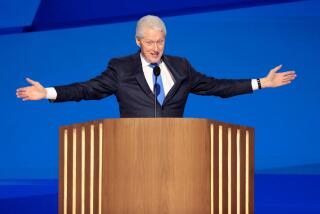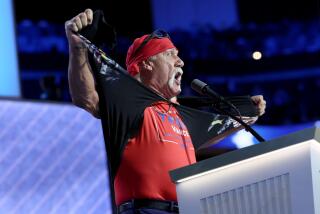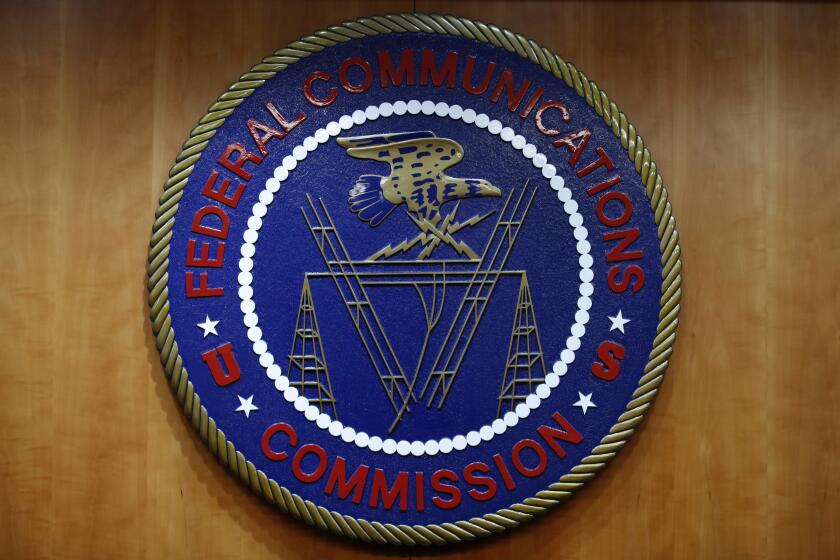Buchanan Attack Upstages Dole at Perot Conference
DALLAS — With an impassioned attack on internationalism, underdog Republican presidential candidate Patrick J. Buchanan on Saturday repeatedly brought a crowd of Ross Perot supporters to their feet--and threw GOP front-runner Bob Dole on the defensive.
Buchanan, Dole and other Republicans hoping to run against President Clinton next year displayed their political wares at a national issues conference sponsored by United We Stand, America, Inc., formed by Perot after his 1992 presidential campaign.
“What are we doing to our own people? What are we doing to our own country?” the feisty Buchanan asked the potentially influential gathering of political activists as he denounced U.S. foreign and trade policy, including the North American Free Trade Agreement and the Clinton Administration’s effort to bail out the Mexican economy.
When it was Dole’s turn an hour later to address the conference, the Senate majority leader seemed ill at ease at times as he delivered a message that contrasted with Buchanan’s. Dole sought to defend America’s leadership role in the world, tracing his view to his own experience as a soldier severely wounded in World War II.
“I know we are all here to try to figure out how to fix America,” he said. But then he recalled his return to Utah Beach in France last year for the 50th anniversary observance of D-day. “I said to myself, if only all of America could be here, if only all of us could see what America meant to the world. Because when America is engaged--whether it’s morally, spiritually, materially or economically--generally good things happen.”
Dole also recalled his experience of greeting the leaders of the new democracies in Eastern Europe. “They didn’t want foreign aid,” he said. “What they really wanted was to be like America.”
Summarizing his view, Dole said: “America is the greatest place on earth. That’s where I come from.”
“This was a tough audience for Dole,” said his campaign manager, Scott Reed, referring to the intense opposition of Perot and his supporters to NAFTA and other international trade policies that Dole has backed.
Dole did make some effort to woo the crowd. In a nod to the intense interest among Perot and his followers in campaign finance reform, Dole backed the formation of a commission to look into the problem.
But, Reed said: “He wasn’t going to spread the red meat out for this audience. That’s not the way Dole is, and that’s why people are going to elect him President.”
Buchanan had no such compunctions. Indeed, his aggressive performance marked an attempt to push his candidacy to a new plateau and rival Texas Sen. Phil Gramm and California Gov. Pete Wilson as top challengers to Dole in the GOP presidential race. Aides said Buchanan had sharpened and carefully rehearsed the assaults he has been aiming at internationalism throughout his campaign for this particular occasion.
“Politicians of both parties sold us out,” Buchanan claimed. Referring to the multibillion-dollar U.S. loans to bolster the Mexican peso earlier this year, he said: “They took Citibank and Chase Manhattan and J. P. Morgan and Goldman Sachs off the hook, and they put us on.”
He added: “I want to say today to all the globalists . . . when I raise my hand to take the oath of office, your new world order comes crashing down.”
Buchanan also complained about a number of recent social changes that he blamed on the overreaching of the federal government. “They turned Easter into Earth Day and worship dirt,” he said. “They took Washington’s name off Washington’s Birthday. It’s now Presidents’ Day. So we all do homage to Millard Fillmore, Franklin Pierce and Bill Clinton.”
Buchanan, despite a strong early showing against then-President George Bush in the 1992 Republican primaries, was lightly regarded when he declared his candidacy for the 1996 campaign. But his relentless energy, name recognition and ability to combine nationalist themes with strong conservative stands on social issues have helped him make gains in recent polls, mostly at the expense of Gramm.
For his part, Gramm eschewed harsh rhetoric in his speech, which was among the last by the GOP candidates. Instead, he provided a glimpse of what America would be like in the year 2001, after the first term of a President Gramm. Largely as a result of balancing the budget, which he has pledged to accomplish during a first term, he predicted that the average American family would each have $3,900 more to spend--money now expended in taxes.
Gramm said that a flat tax would be in effect, making it easier for Americans to file their income tax. He also said: “Your family will be safer because we will be grabbing violent criminals by the throat . . . and the 7% of the criminals who today commit 70% of the violent crimes will be in prison where they belong.”
Wilson, in his comments, joined in the full-throated attacks on the federal government that have marked much of the conference, which ends today. The California governor blasted the federal government as “out of touch, out of step and out of control.”
In line with one of his main campaign themes, Wilson focused on his achievements since winning California’s governorship in 1990. Seeking to contrast himself from his rivals in the GOP race--especially those currently in Congress--Wilson stressed that as governor, he has had direct experience in cutting government spending, reforming welfare, curbing illegal immigration and battling affirmative action.
“A legislator talks and votes. A chief executive acts and leads,” he said.
He also pronounced himself “wryly amused” by senators who have “suddenly discovered” the U.S. Constitution’s 10th Amendment--which says that powers not directly given to the federal government shall be assumed by state and local governments. Wilson’s comment seemed a direct slap at Dole, who during his earlier speech had mentioned the amendment and pulled a copy of it from his pocket.
Still another of the presidential candidates, Indiana Sen. Richard G. Lugar, used his appearance to spotlight an issue he conceded does not have a high public profile--the risk of nuclear materials in the former Soviet Union falling into terrorist hands. Lugar devoted virtually his entire talk to the issue, saying it “must be considered the greatest threat to the security of the United States.”
Lugar’s audience listened respectfully; their most enthusiastic response had come at the start of his speech when he called for abolishing the federal income tax system and instituting a national sales tax in its place.
The other GOP contenders taking the podium Saturday were former Tennessee Gov. Lamar Alexander, Rep. Robert K. Dornan of Garden Grove, former State Department official Alan Keyes, Iowa businessman Maurice Taylor and Pennsylvania Sen. Arlen Specter.
The candidates came here partly in hopes that by courting Perot, they can keep him on the sidelines in next year’s presidential race, given that most polls show the Texas billionaire would most hurt the GOP if he runs again. More immediately, the candidates were attracted to the heavy media coverage given the conference, as well as the potential support they could gain from the 4,000 people who attended it.
“You are . . . a powerful grass-roots group,” Dornan said.
More to Read
Get the L.A. Times Politics newsletter
Deeply reported insights into legislation, politics and policy from Sacramento, Washington and beyond. In your inbox three times per week.
You may occasionally receive promotional content from the Los Angeles Times.










